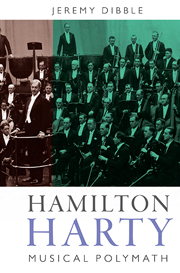
- Publisher:
- Boydell & Brewer
- Online publication date:
- December 2013
- Print publication year:
- 2013
- Online ISBN:
- 9781782041818
- Subjects:
- Ethnomusicology, Music, Music Criticism
Online ordering is currently unavailable due to technical issues. We apologise for any delays responding to customers while we resolve this. For further updates please visit our website: https://www.cambridge.org/news-and-insights/technical-incident


Sir Hamilton Harty (1879-1941) is best known as the conductor of the Hallé Orchestra. As its Principal Conductor between 1920 and 1933, Harty arguably made Manchester the most important focus for music in Britain, since the Hallé were considered to be the finest orchestra in the country. A great exponent of Mozart and especially Berlioz, Harty was also a keen exponent of British music. This book chronicles and analyses Harty's emergence as a conductor between 1910 and 1920, when he did much of his conducting with the LSO in London (in part through his acquaintance with Hans Richter); Harty's tenure at the Hallé; and his departure in 1933, when he became effectively freelance as a conductor. From his first American tour in 1931, Harty became an active supporter of American composers such as Gershwin, and he regularly performed in the US throughout the 1930s. His health began to decline seriously in the late 1930s, and he died from cancer in 1941 at the age of only 61. Arriving in London in 1901 without any qualifications, Harty established himself quickly as London's premiere accompanist. His considerable reputation as a pianist brought him into contact with the great instrumental performers of his age such as Fritz Kreisler, as well as a vast array of singers both native and continental. The book also looks at his life as a composer of orchestral and chamber works and songs, notably before the First World War. Although Harty's music cleaved strongly to a late nineteenth-century musical language, he was profoundly influenced during his days in Ulster and Dublin by the Irish literary revival. Harty's conducting career, his role in the exposition of standard and new repertoire and his relationship with contemporary composers and performers provides a major focus for this book, against the perspective of other important major British conductors such as Sir Thomas Beecham, Malcolm Sargent or Sir Henry Wood. The book discusses why Harty largely remained an orchestral and choral conductor rather than an operatic one, and it also analyses in detail the controversies he provoked on the subjects of women orchestral players, jazz, modernism, and the music of Berlioz, among others. JEREMY DIBBLE is Professor of Music at Durham University.
 Loading metrics...
Loading metrics...
* Views captured on Cambridge Core between #date#. This data will be updated every 24 hours.
Usage data cannot currently be displayed.